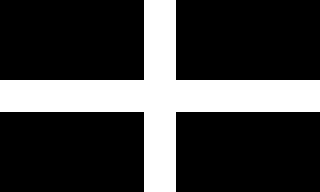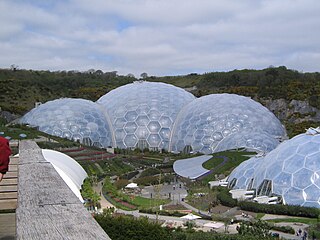Related Research Articles

Cornwall is a ceremonial county in South West England. It is recognised by Cornish and Celtic political groups as one of the Celtic nations, and is the homeland of the Cornish people. The county is bordered by the Atlantic Ocean to the north and west, Devon to the east, and the English Channel to the south. The largest settlement is Falmouth, and the county town is the city of Truro.
Cornish is a Southwestern Brittonic language of the Celtic language family. It is a revived language, having become extinct as a living community language in Cornwall at the end of the 18th century. However, knowledge of Cornish, including speaking ability to a certain extent, continued to be passed on within families and by individuals, and a revival began in the early 20th century. The language has a growing number of second-language speakers, and a very small number of families now raise children to speak revived Cornish as a first language. Cornish is currently recognised under the European Charter for Regional or Minority Languages, and the language is often described as an important part of Cornish identity, culture and heritage.

English Heritage is a charity that manages over 400 historic monuments, buildings and places. These include prehistoric sites, medieval castles, Roman forts and country houses.

A pasty is a British baked pastry, a traditional variety of which is particularly associated with Cornwall, South West England, but has spread all over the British Isles. It is made by placing an uncooked filling, typically meat and vegetables, in the middle of a flat shortcrust pastry circle, bringing the edges together in the middle, and crimping over the top to form a seal before baking.

The history of Cornwall goes back to the Paleolithic, but in this period Cornwall only had sporadic visits by groups of humans. Continuous occupation started around 10,000 years ago after the end of the last ice age. When recorded history started in the first century BCE, the spoken language was Common Brittonic, and that would develop into Southwestern Brittonic and then the Cornish language. Cornwall was part of the territory of the tribe of the Dumnonii that included modern-day Devon and parts of Somerset. After a period of Roman rule, Cornwall reverted to rule by independent Romano-British leaders and continued to have a close relationship with Brittany and Wales as well as southern Ireland, which neighboured across the Celtic Sea. After the collapse of Dumnonia, the remaining territory of Cornwall came into conflict with neighbouring Wessex.

The constitutional status of Cornwall has been a matter of debate and dispute. Cornwall is an administrative county of England.

Daniel John Rogerson is a Cornish-British Liberal Democrat politician. He was the Member of Parliament (MP) for North Cornwall from the 2005 general election until his defeat at the 2015 general election. In October 2013, he became the Liberal Democrat Minister at the Department for Environment, Food and Rural Affairs, holding the office until losing his Parliamentary seat to Conservative candidate Scott Mann.

The culture of Cornwall forms part of the culture of the United Kingdom, but has distinct customs, traditions and peculiarities. Cornwall has many strong local traditions. After many years of decline, Cornish culture has undergone a strong revival, and many groups exist to promote Cornwall's culture and language today.
The Cornish people or Cornish are an ethnic group native to, or associated with Cornwall and a recognised national minority in the United Kingdom, which can trace its roots to the Brittonic Celtic ancient Britons who inhabited Great Britain before the Roman conquest. Many in Cornwall today continue to assert a distinct identity separate from or in addition to English or British identities. Cornish identity has been adopted by migrants into Cornwall, as well as by emigrant and descendant communities from Cornwall, the latter sometimes referred to as the Cornish diaspora. Although not included as a tick-box option in the UK census, the numbers of those writing in a Cornish ethnic and national identity are officially recognised and recorded.

Cornwall Council, known between 1889 and 2009 as Cornwall County Council, is the local authority which governs the non-metropolitan county of Cornwall in South West England. Since 2009 it has been a unitary authority, having taken over district-level functions when the county's districts were abolished. The non-metropolitan county of Cornwall is slightly smaller than the ceremonial county, which additionally includes the Isles of Scilly. The council has had a Conservative Party majority since the 2021 local elections. Its headquarters is Lys Kernow in Truro.
A Cornish Assembly is a proposed devolved law-making assembly for Cornwall along the lines of the Scottish Parliament, the Senedd and the Northern Ireland Assembly in the United Kingdom.

Hall for Cornwall, known as Truro City Hall until 1997, is an events venue in Boscawen Street in Truro, Cornwall, England. The building, which was previously the headquarters of Truro City Council, is a Grade II* listed building.

Saint Piran's Day, or the Feast of Saint Piran, is the national day of Cornwall, held on 5 March every year. The day is named after one of the patron saints of Cornwall, Saint Piran, who is also the patron saint of tin miners.

The economy of Cornwall in South West England is largely dependent upon agriculture, followed by tourism. Cornwall is one of the poorest areas in the United Kingdom with a GVA of 70.9% of the national average in 2015. It is one of four areas in the UK that qualified for poverty-related grants from the EU. Farming and food processing contributed £366 million to the county's economy in 2006, equal to 5.3% of Cornwall’s total GVA. The agriculture industry in Cornwall employed 9,500 people as of 2011. 23,700 more were employed in the food industry in Cornwall. The Cornish economy also depends heavily on its successful tourist industry, which contributes 12% of Cornwall's GDP and supports about 1 in 5 jobs. Tourism contributed £1.85 billion to the Cornish economy in 2011.

Cornish nationalism is a cultural, political and social movement that seeks the recognition of Cornwall – the south-westernmost part of the island of Great Britain – as a nation distinct from England. It is usually based on three general arguments:

Cornish devolution is the movement to increase the governing powers of the County of Cornwall.

In the United Kingdom, devolution is the Parliament of the United Kingdom's statutory granting of a greater level of self-government to the Scottish Parliament, the Senedd, the Northern Ireland Assembly and the London Assembly and to their associated executive bodies: the Scottish Government, the Welsh Government, the Northern Ireland Executive and in England, the Greater London Authority and combined authorities.
The Stadium for Cornwall was a proposed multi-purpose stadium in Threemilestone, Cornwall, a county within the British Isles. There are no major sports stadia in Cornwall: the largest capacity ground is the Recreation Ground in Camborne. Football club Truro City and rugby union team Cornish Pirates have both advanced plans for a new stadium, with both clubs requiring new facilities if they are to progress in their respective sports. Cornwall Council is developing a business plan for the stadium; although it initially stated any project would have to be privately funded, in April 2018 councillors voted to provide partial funding of £3m towards the estimated total of £14.3m for the project. In June 2022 following Cornwall Council’s withdrawal of funding the Stadium for Cornwall board voted to cease co-developing the Stadium.
Surfing Tommies is a 2009 play by the Cornish author Alan M. Kent. It follows the lives of three members of the Duke of Cornwall's Light Infantry on a journey from the mines of Cornwall to the fields of Flanders, where they learn to surf from South African troops. It has been adapted as a radio play and was toured round Cornwall by Bish Bash Bosh Productions in 2009 and nationally in 2011.

Kresen Kernow in Redruth, United Kingdom is Cornwall's archive centre, home to the world's biggest collection of archive and library material related to Cornwall. Funded by the National Lottery Heritage Fund and Cornwall Council and opened in 2019, it brings together the collections which were previously held at Cornwall Record Office, the Cornish Studies Library and Cornwall and Scilly Historic Environment Record as well as in various outstores.
References
- ↑ "White Paper for Culture" (PDF). Cornwall Council.
- ↑ "Bish Bash Bosh". In this way we hope to develop a National Theatre for Cornwall [Gwaryjy Kenedhlek rag Kernow]. Archived from the original on 4 August 2011. Retrieved 2 February 2012.
- ↑ The Hall for Cornwall Trust, Follett Stock. "2595122 21 September 2011 (41)". The National Theatre of Cornwall theatre and entertainment services. The Intellectual Property Office. Retrieved 2 February 2012.[ dead link ]
- ↑ Scott, Paul (2010). "The Theatre of Cornwall - a review". Cornish Story. Gwav–Winter. Retrieved 2 February 2012.
- ↑ "National Theatre hope highlighted by report". West Briton. 2 February 2012. Archived from the original on 14 September 2012. Retrieved 2 February 2012.
